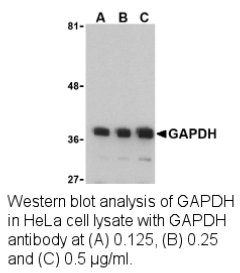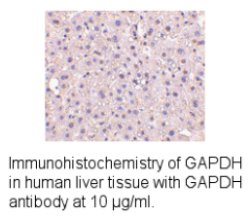Anti-Human GAPDH (NT)
Data
- -
- -
Antibody DetailsProduct DetailsReactive Species Human Host Species Rabbit Immunogen PN:G628 Product Concentration 0.5 mg/ml Formulation This polyclonal antibody is formulated in phosphate buffered saline (PBS) pH 7.4 containing 0.02% sodium azide as a preservative. Storage and Handling This polyclonal antibody is stable for at least one week when stored at 2-8°C. For long term storage, aliquot in working volumes without diluting and store at –20°C in a manual defrost freezer. Avoid Repeated Freeze Thaw Cycles. Country of Origin USA Shipping Next Day Ambient RRIDAB_2830247 Each investigator should determine their own optimal working dilution for specific applications. See directions on lot specific datasheets, as information may periodically change. DescriptionDescriptionSpecificity Rabbit Anti-Human GAPDH recognizes an epitope near the amino-terminus of human, mouse and rat GAPDH. This polyclonal antibody was purified using affinity chromatography. Background Glyceraldehyde-3-phosphate dehydrogenase (GAPDH) catalyzes the reversible oxidative phosphorylation of glyceraldehyde-3-phosphate in the presence of inorganic phosphate and nicotinamide adenine dinucleotide (NAD), an important energy-yielding step in carbohydrate metabolism. Recent evidence suggests that it also is involved in a number of cellular processes such as membrane fusion, phosphotransferase activity, DNA replication and repair, and nuclear RNA export (1). GAPDH has also been implicated in playing a role in different pathologies such as cancer progression, apoptosis, and neuronal diseases such as Alzheimer’s and Huntington’s disease (2). GAPDH is constitutively expressed at high levels in almost all tissues and cell lines making it ideal for use as a loading control marker in immunoblots. PubMed References & Citations1. Sirover, MA. (2005) J. Cell. Biochem. 95:45 2. Senatorov, V. et al. (2005) Annu. Rev. Pharmacol. Toxicol. 45:269-90. Technical ProtocolsCertificate of Analysis |
Related Products
- -
- -
Prod No. | Description |
|---|---|
G625 | |
G626 | |
G627 | |
G628 |
 Products are for research use only. Not for use in diagnostic or therapeutic procedures.
Products are for research use only. Not for use in diagnostic or therapeutic procedures.




